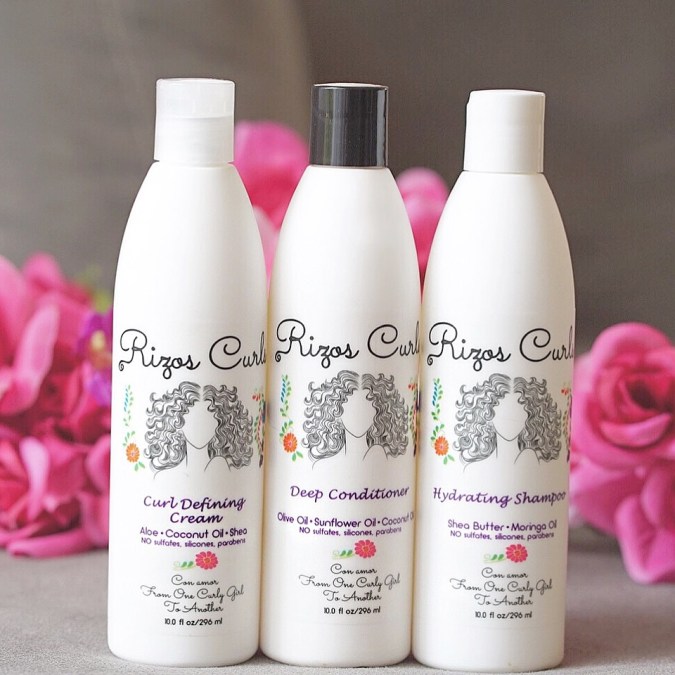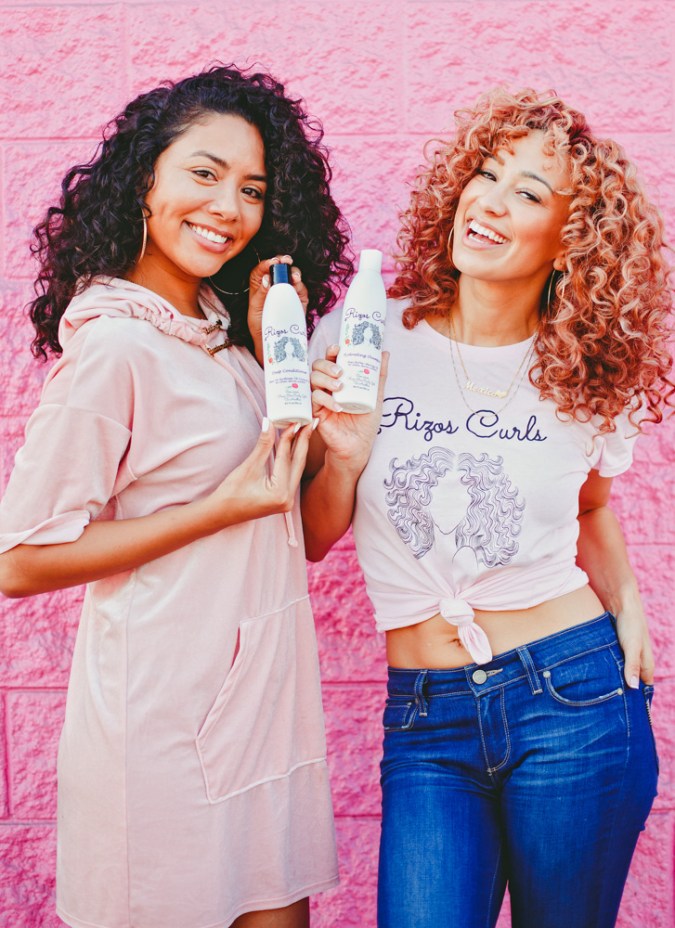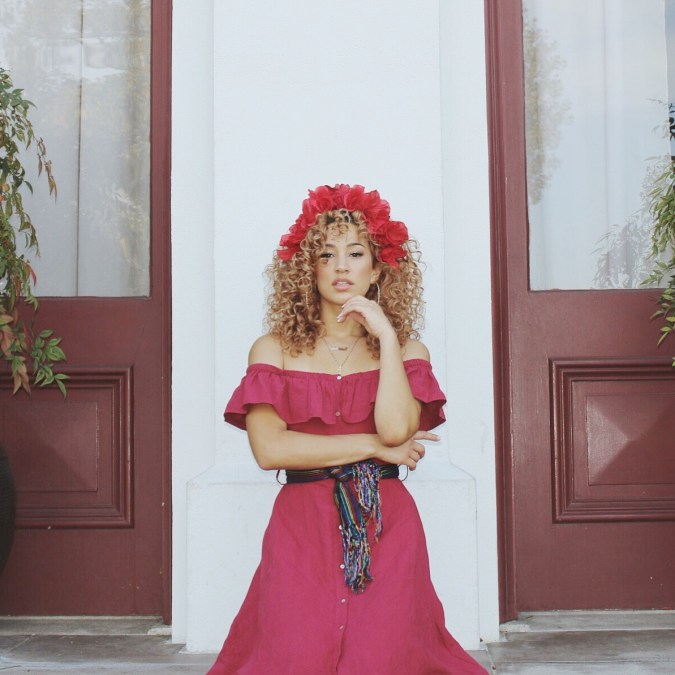With her bouncy, pink-hued curls, Julissa Prado serves as the best testament to the effectiveness of her products. Six months ago, she officially launched Rizos Curls, an all-natural hair brand for curlies. In that time, 27-year-old Prado has amassed 27,000 followers on Instagram, received up to a thousand orders per month, and quit her job to pursue her business full time. Soon, she’ll move her business out of her parent’s and uncle’s houses – which serve as storage and fulfillment centers, respectively – and launch three new products: a gel, a refresher spray, and a leave-in conditioner. If you’re on the outside looking in, it might seem that Prado is an overnight success. But the truth is she’s invested more than four years into Rizos Curls. And if you look even further back, you’ll see someone who’s searched for products like hers – that is, those that fight frizz without resorting to harsh chemicals – most of her life.
“I always saw everybody around me had wavy, curly, coily hair textures, the majority of my community,” she tells me during a visit to the Remezcla offices one day in late March. “And I felt like everybody wore it straight. It was such an obsession to straighten your hair. I remember the first time that my hair was straightened – I always tell this story – that my cousins laid my head over the ironing board and ironed it straight with a clothes iron. But I just remember even back then thinking, there’s gotta be a better way.”
And for some time – inspired by her grandmother who taught her how to make substitutions with natural products – that meant carrying limón in her purse when she wore her hair in a slicked-back ponytail. “My friends would always be like, oh lemon [pulp] is in your hair,’ like little pieces of it would come out,” she said. “I was always trying to make my own concoctions.”

She realized that to start her own hair care line, she’d need to enlist a professional chemist so that she could create the product of her dreams – one that didn’t leave chunks of fruit in the user’s hair. It’s by no means an inexpensive business venture, but as someone who always flirted with the idea of starting this company, Julissa began saving at 15. In about a decade, she saved $80,000, with half of her savings going directly into developing formulas and creating the hydrating shampoo, deep conditioner, and curl defining cream. But despite the initial investment, Julissa is building a very DIY business. During our one-hour conversation, two things became increasingly clear: Her family is a big part of her success and Julissa wholeheartedly subscribes to the “fake it ’til you make it” philosophy.

With Latinas creating businesses at higher rates than pretty much anyone else, we decided to pick Julissa’s brain. Below, check out a few lessons she’s learned along the way – some of which you can apply to your own business, regardless of your field.
Her responses have been lightly edited and condensed for clarity.
On taking time to find the right collaborators:
The first two years, I was with one lab. I wanted to make sure that every ingredient that I used, I didn’t just have any kind of aloe vera – it’s potent, it’s organic, it’s a good ingredient that’s actually going to give me the benefits. Because you can get lazy or get cheap and you use a non-potent one and still put it on the label, but it doesn’t give me the benefits. The first two years, I was with one lab. I Invested a lot of money into figuring out the samples and the process, but I had to move on. I had to stop myself and say, “I don’t care how long this takes.” It just didn’t feel right. The ingredients, like they kept putting chemicals in that I didn’t like.
“I had to stop myself and say, ‘I don’t care how long this takes.'”
That was a bigger, more glamorous lab that I had been working with. And then, it was almost like the stars aligned when I found the second lab. It’s Nigerian family owned. The chemist, she’s Jamaican. And so I felt like what our cultures had in common was that we both really valued natural ingredients. We both came from a very strong family background.
Going through that process, it taught me the lesson of being very mindful who I do business with and how important it is for me that whoever I interact with on a business relationship is not just business. I want our mindsets to align. I want to have that chemistry.

On the importance of Google:
Although I did have a strong business background, I didn’t have a strong business background on how to start my own business. I had a strong business background in the sense of understanding the 4 Ps of marketing (Price, Product, Promotion, and Place). I don’t want anybody to feel deterred – like, “If I don’t have that background, I can’t start my own business.” Not at all. I think for for me, it was just the process. Everybody has their own process. In general, Google is your best friend. You don’t have to know something; you can Google it and then you’ll know. I Googled, “OK, do I need a fictitious business name? How does it work?” It’s a lot simpler than it sounds. There’s so many articles.
On what her neighborhood taught her:
I always tell people: Being a business owner, being an entrepreneur, I didn’t learn that from going to college and going to grad school and working. No, no, no. I learned the entrepreneurial spirit from growing up in the hood. No one is more entrepreneurial than Latinos and people in the hood. The big takeaway that I got is that you don’t have to really know what you’re doing necessarily. You don’t have to have it all figured out, you can start a business with nothing. You can have zero marketing dollars. You can just have an idea and a dream and a hustle. You learn as you go, and you just trust your own process.
On embracing”fake it til you make it”:
I met this salon owner, and she had used Rizos and she said, “Hey, I have this salon. I would love to carry your products.” It’s a Latina business owner – another Latina from Mid-City, which is where Rizos headquarters is at – whose salon is on Rodeo Drive. She offered to have our launch party there, and then randomly, when I was visiting her, the owner of the entire building – because she had one of the businesses in this big building with an outside courtyard and everything – was there. I spoke to her, and she’s like ‘Oh, you can have it in the whole courtyard.’ So we ended up having like an outdoor-indoor party, and it looked so professional, like I was a huge company. That was wonderful. It looked like it was a million dollar event, with like a thousand dollar budget.
On creativity and swag:
You can have zero marketing dollars and just open an Instagram page, open a Facebook page, and just go hard. Buy some pink paper – which I did for like $5 – put my bottles there. I added some fake flowers, some real flowers and you can just – again, fake it ’til you make it – and make it look much bigger and so beautiful. All you need is creativity. Our cultures are that; Black and brown people, our culture alone is everybody else’s swag. True creativity and that true swag and flavor comes when you have minimal things, and you have to actually be creative to put it together.

On how her family contributes to her success:
My storage is at my parents’ house; my fulfillment is my Tío Juan’s garage. And across the street are – I call it – the Pinches Taco headquarters, which is my cousins that have these restaurants in LA called Pinches Tacos. So when we need anything, I’ll say, “Hey Pinches Tacos, can we have a table?” And they’ll let us borrow a table. I’ll also have different little cousins on rotation to help fulfill. I pay them hourly. They’re like 15, 16, and they’re like, “OK, I’m putting in my hours.” My brother, I call him my CFO. He’s very good with numbers, and I force him to help me with the accounting, the finance end of it.
It’s all hands on deck. At my launch party in October, we had my cousins of Pinches Tacos in one corner. My dad was a bartender. My mom was bossing people around. My little sister and my little cousin were making elotes in one stand. My tía made all the aguas frescas.
On getting organized:
So how do I keep everything organized? I make a lot of lists. In 2017, it was a little all over the place. I didn’t have too much direction. It was more reactionary the way that I would do everything. I would be like, “Oh my God, I have this emergency. What am I gonna do?”
“In 2017, it was a little all over the place. I didn’t have too much direction.”
But in January 2018, what I decided was to give everybody roles. That’s why I said “OK, Monica is my CMO. My brother’s my CFO, my finance. I’ll be the CEO, and I’ll do operations and whatever else is needed.” But in giving people roles, it helped me so much because then I have duties. For example, my brother takes care of all the money stuff, the accounting stuff. He also gives me a budget – a budget for marketing, he gives me a budget for samples. He gives me an idea of like, “OK, you’re going overboard.” Or he gives me goals, too, which is amazing. He kind of created that structure and that’s been super helpful in keeping track of my life and having some more direction.
Now I make lists, too. I make sure to write things down and put in my calendar and planning. Planning is so important. I planned my year quarterly, and then I planned it monthly. I kind of followed the same structure that you do in corporate. We’d forecast a year ahead of time. I planned out by quarters what the theme was going to be like, my my goals each month, the type of promotions I wanted to run, what I wanted to focus on doing. I wanna have a theme and purpose every month that I have planned ahead of time, so I’m not scrambling every weekend.




